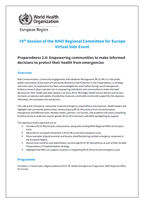
RC74 side event: Preparedness 2.0 - Empowering communities to make informed decisions
9 September 2024

Preparedness 2.0: Empowering communities to make informed decisions to protect their health from emergencies (RCCE-IM)
9 September 2024,10:00–11:30 (CEST)
Highlights
On 9 September, in a virtual side event of the 74th session of the WHO Regional Committee for Europe entitled “Preparedness 2.0: Empowering communities to make informed decisions to protect their health from emergencies”, health leaders highlighted vital community partnerships. They also showcased top risk communication, community engagement and infodemic management (RCCE-IM) practices from recent European emergencies and recommended effective tools.
RCCE-IM was introduced as a crucial public health intervention in emergencies. Evidence shows it empowers individuals and communities to make informed health decisions, bridging the gap between health service delivery and access. By increasing acceptance of protective measures and fostering community support, RCCE-IM plays a pivotal role in saving lives.
WHO European Region Member States, partners, civil society and academia shared compelling frontline stories to make the case for greater RCCE-IM investment, with WHO spotlighting its support. They discussed how countries and stakeholders can leverage RCCE-IM interventions as part of their broader emergency strategies and plans and highlighted how WHO can support countries in integrating RCCE-IM across the emergency cycle.
Quotes from health leaders
“Community resilience and protection has been placed at the very heart of ‘Preparedness 2.0’, the new regional strategy and action plan for health emergencies,” said Dr Hans Henri P. Kluge, WHO Regional Director for Europe. “In the last years, we have seen the erosion of trust, fuelled by the spread of false information. So, we must invest in building – and rebuilding - relationships.”
Birgitte Bischoff Ebbesen, International Federation of Red Cross and Red Crescent Societies (IFRC) Regional Director for Europe, urged, “Real protection happens when communities are actively engaged and interventions are tailored to their unique risks and needs. Solutions need to resonate and benefit those they are meant to help.”
Nedret Emiroglu, Director, Country Readiness Strengthening for Emergencies, WHO Health Emergencies Programme, echoed this sentiment. “To make community protection truly effective, we need to forge and strengthen partnerships across multiple sectors and stakeholders. This includes social protection, business continuity, education, food security, and psychosocial support.”
Gail Carson, Chair of Preparedness 2.0, remarked, “We’re stepping into a new era of co-development and co-delivery, where we work hand-in-hand with communities to not just share information and provide services, but to collaboratively create and implement solutions.”
Showcasing community empowerment
Addressing the profound realization that RCCE-IM is not just a supporting function but a central pillar in effective emergency management, Member States have embarked on initiatives to build and strengthen RCCE-IM at both the system and individual levels. Dr Joel Stanojevich from the Centers for Disease Control and Prevention, Eastern Europe and Central Asia Regional Office, and Ms Manon Hupin from Belgium’s Federal Public Service Public Health illustrated how they have harnessed the lessons from COVID-19 to drive skill-building initiatives. Professor Luís Velez Lapão from Universidade Nova, Portugal, showcased a collaborative initiative with WHO in which community representatives are being trained and equipped to prepare for future earthquakes. Mr Vladimor Veljkovic from Association DUGA in Serbia highlighted the importance of engaging the affected community in the lead-up to Serbia’s Pride event, underscoring how the response to the mpox outbreak in 2022–2023 exemplifies a successful community-centred approach.
Mr Gheorghe Buruiana from the Association of Medical Students and Residents in Moldova shared how medical students, in partnership with WHO, were trained to combat COVID-related false information, showcasing the crucial role that informed and engaged communities play in this fight. Finally, Ms Siân Crucefix from The Lancet explained the journal’s role in addressing false information, highlighting the necessity of collaborative approaches.
Event notice
9 September 2024,10:00–11:30 (CEST)
Risk Communication, Community Engagement and Infodemic Management (RCCE-IM) is an essential public health intervention that connects people to health information, services and actors, and helps affected populations make informed choices to protect their health.
The objectives of this side event are to:
- introduce RCCE-IM concepts and related WHO guidance and tools;
- share examples of international best practices and the lessons identified during multiple emergency responses; and
- discuss how countries can use RCCE-IM for emergency preparedness and response as part of a broader Preparedness 2.0 strategy, and to discuss how WHO can support countries to use RCCE-IM.
Programme
Publications
All →Tools









